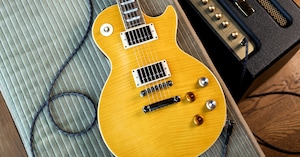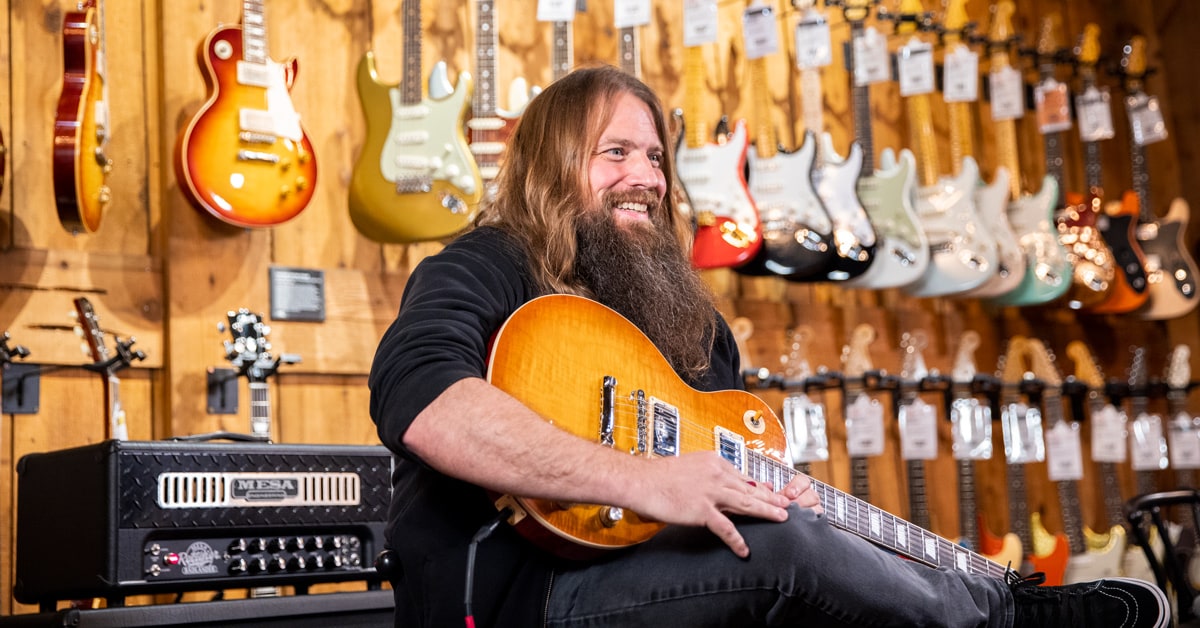From their very beginning, a key part of Lamb of God's brutal dual-guitar attack has been the sound of MESA/Boogie amps in the hands of Mark Morton and Willie Adler. Characterized by tight, powerful gain, and polyrhythmic and odd time signature riffage, Lamb of God hugely influenced the resurgence of a distinctly American school of metal. Just before he stepped on stage at our flagship Hollywood store to discuss the release of the MESA/Boogie Mark VII, we had a chance to chat with Mark Morton about his long history with MESA/Boogie.
Tell us a little bit about how you first got started with MESA/Boogie.
Mark Morton: I got my first MESA/Boogie in 1994, and it was a Boogie Mark IV. I bought it used at a local music store in Richmond, Virginia. I’d heard about Boogie, but I don’t remember if I had actually heard one in real life. I just knew that it was a real hot, hip amp, and I wanted to know what it was about. So, there was a used one in the store, and I tried it out. What I learned very immediately from that head was that I didn’t need any pedals. I didn’t need anything. Between all the gain that was available on that amp, paired with the five-band EQ, it just opened up a spectrum of tones you could dial in. I had everything I needed in the amp, and I was pretty impressed with that. So, I was able to scrape up some money and get that head, and I used that head for a long time, even into Lamb of God. It eventually got played out. But that was the one. That's what really got me on it, and I never really looked back.
It sounds like a mixture of “it sounds really good,” but also, to some extent, utility, given the range of sounds you could get out of it.
Yeah. It sounded better without pedals than the other amps I was using with pedals, you know what I mean? Just the way, particularly, the amp saturated … the gain structure of the Mark IVs. There's this kind of creaminess to the gain structure. It's very silky and has very tight gain. It makes for a very accurate response from the amp, particularly to the style of playing that I do and, more particularly, to Lamb of God, where I'm doing fast stuff but on the lower-register strings. So, I need the distortion to solidify very quickly and be very accurate. And that's what that amp was able to do—between finding the right mid EQ on it and the way it saturates. It was just the perfect storm for the type of music and the type of riffing I was doing.
How long did that Mark IV stay in your rig?
A very long time. There were times when I was folding in other amps into the rig, but for a lot of years it seemed like a Mark IV would always sneak its way back into the rack.
Was that for both studio and live use?
For sure.
Do you use your amps any differently when recording versus when you’re playing live?
The short answer is yes. For the main rhythm parts, I'm usually trying to stay pretty true to my tone. And it's the same tone I use live. But when you start working in these super sterile, miked-up environments, and producers get a hold of your stuff, they always have certain things. I was actually talking to my producer this morning about this very phenomenon where we can have two good tones. He's looking for something different [from me] that's going to track differently in the sonics. He has to mix the record. So, he has to carve out room for the bass and room for the other guitar, and that kind of thing. That's an agenda that a producer has. So, sometimes, we work around that if we're recording. But from my perspective, I'm almost always trying to stay accurate to what I consider to be my tone.
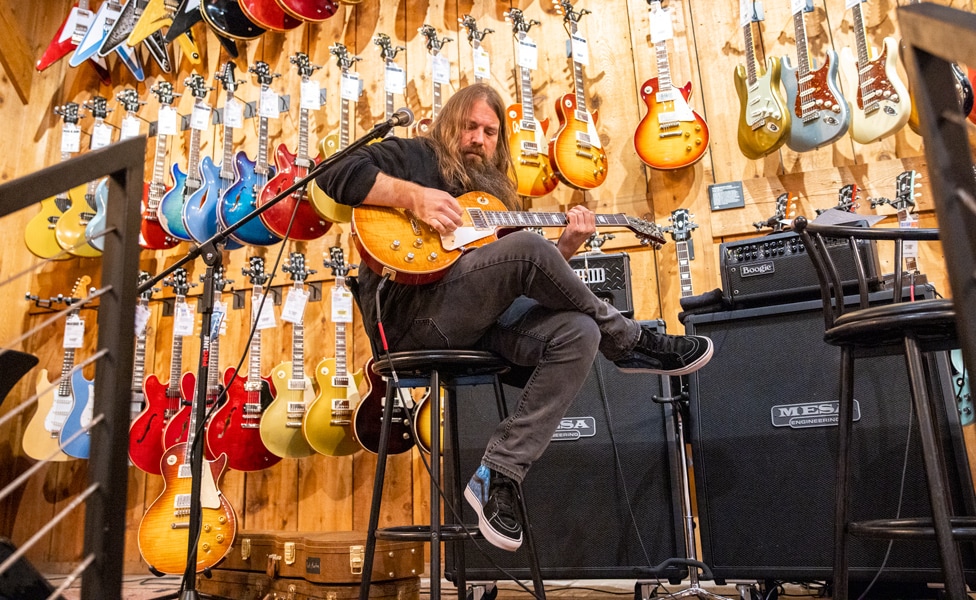
How would you describe your tone?
Wow. I've never thought of that, having to describe it. I know it when I hear it. [laughs]
I think, for me, it depends on what I'm doing. Clearly, we're talking about Lamb of God here. That's the stuff that I do with the biggest profile.
At home, I'm kind of a blues rock guy. My favorite bands are the [Rolling] Stones and [Led] Zeppelin. I love the Black Crowes. I love Blackberry Smoke. So, obviously, the tones I'm dialing in there are going to be a little grainier, a little more open, and a little less gained-up.
For Lamb [of God], I would say my tone is more mid-oriented than a lot of modern metal bands. And I like the gain. Again, it's all about the gain structure and the response. I like a very tight gain that I describe as being akin to thumping on a very ripe watermelon with your finger. It’s gotta be really tight and respond quickly, but also tighten up very quickly as well.
Yeah. So, you're not looking for tube rectifier sag so much.
I'm not looking for soggy-bottom Rectifier tones, although those are great when you're doing big, open chords. They bloom in a way that is very practical for bands that have these big, spacious chord movements. We tend to be faster and move around a little quicker. So, we need a faster response, more accuracy.
Can you tell us a bit about your evolution with Boogie over the years from first plugging into that Mark IV in ’94? That's coming up on three decades.
I became a Boogie player just walking into a music store and trying one out, playing it and then really cherishing it.
I found out, through trial and error, that there's a specific type of 6L6 power tube that I had gotten a hold of. They're the oldest of that line, and they have a very specific shape. They're not just the straight cylinder ones, right? They're more of a lightbulb-type shape. I had no idea what the difference was, I just knew I had these great-sounding tubes. When I had the straight shaft ones, they sounded good, but there was something just slightly different. So, I just cold-called MESA/Boogie, and I said, “Hey, man, where do I find those funny-shaped tubes?” And the guy's like, “You talking about 6L6s?” “Yeah.” “You want those older ones? Those are hard to find now. You can hear the difference?” I was like, “Yeah, I can hear the difference. I mean these [newer ones] are cool, but those are better. Are they around?” And he was like, “Alright, what are you doing? Who are you? What are you doing?”
So, I got to talking, and that was Tim McKee, who was working at Boogie for a very, very long time. He says, “I’ll tell you what. I got a few of them here. I’ll send you some tubes. Keep my number. Let me know if you need anything.” And then that's what really started the relationship, and I took him up on that. I was broke. We were riding around in a van, sleeping on peoples' floors. But they were there.
Boogie knew what we were doing. We were bubbling a little bit. We had a record coming out, and we were doing little things that were getting more notoriety and raising our profile. But Boogie really supported me very, very early on. Probably more than maybe they should have, really. But they really had my back, and I really love their stuff. I'm still really proud to play it.
Am I remembering correctly that you worked with them a bit on the Mark V while it was in development?
I can't say that I did work with it, but I gave some feedback. I was able to play through a really early proto. We were actually on tour, opening for Metallica. We came through Northern California there, and the guys brought out a prototype Mark V. I set it up, and I had my tech go get one of my Mark IVs and A/B'ed them, because I was a bit salty about it. I was like, “You can't beat the Mark IV,” you know what I mean? So, I was A/B'ing them. And there's things that the V does better than the IV, definitely, but there's some things that I missed about the IV.
You’ve had access to a lot of Boogie amps over the years. Is there a through-line you pick up on across all of them? What makes a Boogie a Boogie, to you?
Well, there's a lot of variety in the different models of Boogie. They have such a wide lane in terms of the things they do. I think there's a philosophy as I see it about the company. And I think that's really cool. I sound like I'm getting paid by them, but I’m not. This idea that they're constantly coming up with new models and trying to see what they can do. They’re asking what they haven't done yet and doing something new. Now, that's within the context of making tube amps, and I relate to that because I feel like I understand that sort of overriding philosophy, just in terms of my band. I'm in this thrash metal band, and there's a lane that we have but I am constantly, with each new project, trying to figure out what can I do within this lane that we haven't done yet that's interesting. What's left to explore in the context of this project? And so, I relate in that sense.
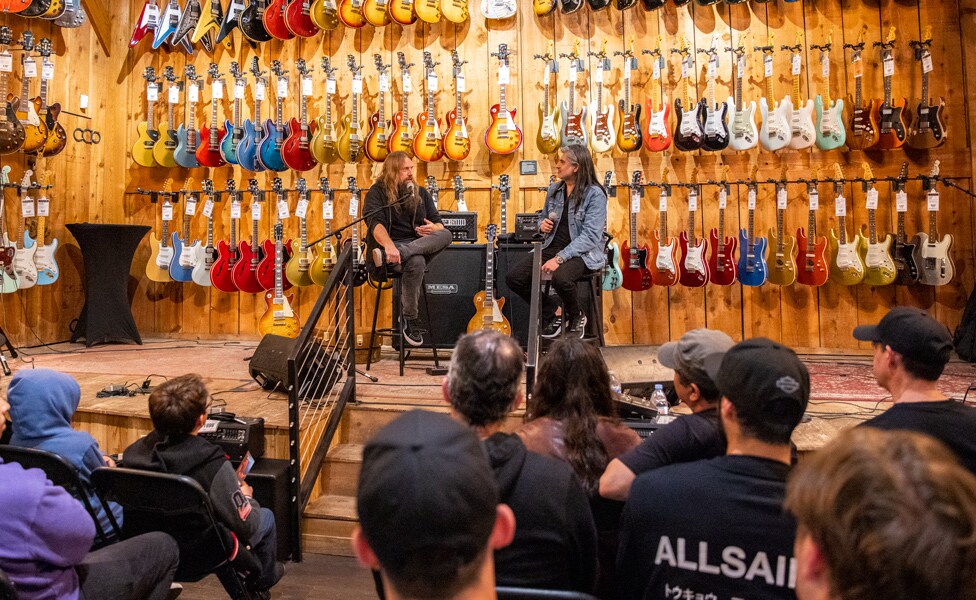
So, you’ve now had the Mark VII for a few weeks. What jumps out to you about it? Any favorite modes?
There's a few, really, as I’m starting to dig in and get more familiar with it. The 2C mode is really cool. The Mark VII mode is cool. The Mark IV mode I feel like is truer to an actual Mark IV than the last one that was on the Mark V.
It was explained to me that this amp is very much a “greatest hits” Mark series amp. And that makes sense to me. I think they've definitely done it. Yeah, it's a cool amp. I think the variety of things you can do to it, the number of things it does well, is a net gain, for sure.
You announced last fall that you were officially switching to Gibson. Have you had to drastically change anything in your setup since that change?
Here's the thing. I switched to Gibson, officially, but Gibson was always there for me. I've had a Les Paul since I was 14 years old. I've never not had one since then. I've used them on albums all along. That's not a dig at Jackson, who I was playing with. I’ve got nothing but love for Jackson. I’m really proud of the work we did there. We made some really, really cool guitars, and I love the people I work with. But Gibson was always there in the background for me. So, when I had the opportunity to come and be official and play Gibsons onstage, and to work with Gibson proper, I had to jump on it. The model I was playing before was very much based on my actual Les Paul that I had at home. So, it wasn't a drastic shift, in terms of the layout of the guitar or the way things were set up practically on the instrument. It was just kind of making it official, really.
And now that you’re officially working with Gibson, is there anything we can look forward to coming out of that partnership in the future? Maybe you can’t talk about that just yet! [laughs]
I think there are definitely things to look forward to with Gibson. Everyone I've been working with there has been really, really interested in hearing my feedback and what kind of ideas I have about doing some things. Just thoughts and concepts I have about instruments, and what I love and what applies to what I do. So, everyone has been really receptive to my insight, and I'm grateful for that.
So, that’s my answer. [laughs] Can you tell that I majored in political science?
So, you've had a Mark VII a few weeks now. Is that going to work its way into your rig for your shows over the next few months?
Not immediately. We are so tooled up with the Badlander right now, and I'm really happy with the Badlander. We're going to have do a whole 'nother interview about that because I love that amp, and it's been working great for me! So, I don’t feel like we need to retool the entire road rig right now. I like the Mark VII, and I can certainly see using it in studio stuff and maybe migrating into the live setup, too, as I get more familiar with it.
You talked a little earlier about how in the context of your guitars, that it's not just about you. It's about how it fits into the larger mix. So, speaking to that, Willie is also quite a Boogie fan. When you approach your sound, are you guys finding space for each other? What’s the back and forth like?
Willie and I are a great combo because we play so drastically different. He is ridiculously fast. His meter is so accurate, and he plays very, very light. He sets up his amp intuitively to support the way he plays. I'm super ham-fisted. I'm lazy on the beat. I have a different sort of pocket to him. So, he kind of tightens me up, and I sort of groove him up a little bit. It's a wonderful mesh. And I think our tones sort themselves out that way, too, just by nature of the fact that we're dialing in different things to adjust for our playing style, just out of practicality. A sound engineer maybe has to wrestle with those things a little bit, but that's above my pay grade. [laughs]
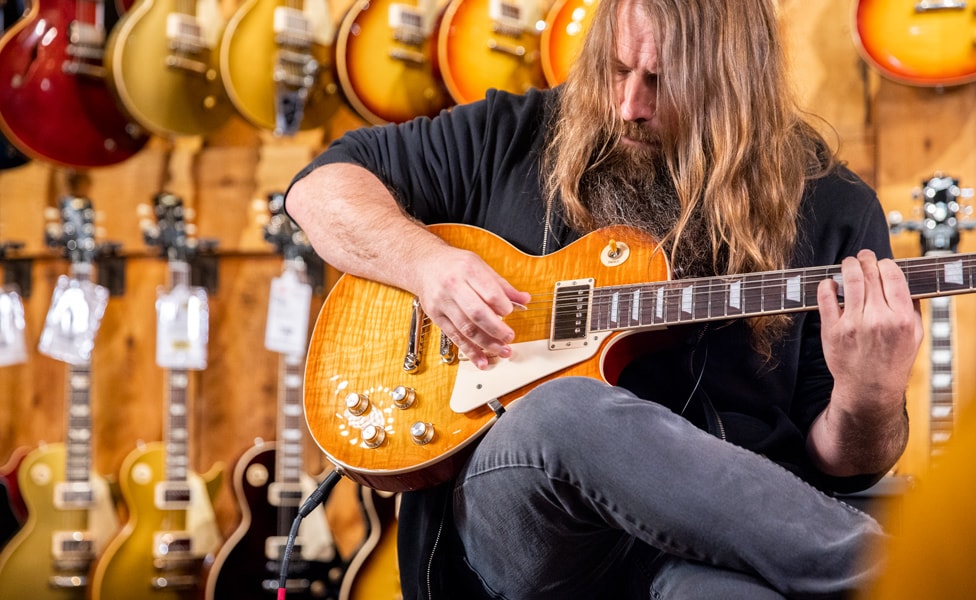
So, what’s coming up on the horizon for you and the band?
We’ve got a bunch of shows this summer. We’ve got some festival dates in July. And then we're starting a North American tour, supporting the Pantera tribute reunion shows that they're doing. So that's a pretty extensive tour, with some festivals worked into that. And then, we have our own cruise ship that we're doing in the fall with like 12 or 15 bands. We're headlining that. It sold out in a week! So, we're going to sail to the Bahamas with a bunch of metal bands, blasting the whole way. It should be fun.
How long is that?
Four days, four nights.
What are the noise and curfew concerns like for a cruise ship?
You're out in the middle of the ocean, right? [laughs]


